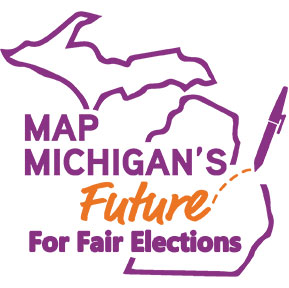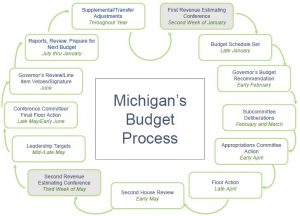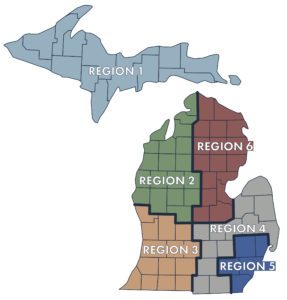Huge Senate majority approves 4-year terms for commissioners
 By a vote of 32-4, the Michigan Senate approved Senate Bills 242, by Sen. Ed McBroom (R-Dickinson), and SB 245, by Sen. Jeremy Moss (D-Oakland), which would bring four-year terms for county commissioners to Michigan in the 2024 presidential election cycle.
By a vote of 32-4, the Michigan Senate approved Senate Bills 242, by Sen. Ed McBroom (R-Dickinson), and SB 245, by Sen. Jeremy Moss (D-Oakland), which would bring four-year terms for county commissioners to Michigan in the 2024 presidential election cycle.
The roles of a county commissioner and the level of expertise necessary to oversee county government functions have increased substantially since the Legislature abolished the board of county supervisors in 1966 and created the county board of commissioners.
The bills will be referred to the House Committee on Local Government and Municipal Finance on Tuesday.
MAC continues to encourage commissioners to add their voices to the four-year term effort. As of Friday morning, 73 county leaders had responded. Please add your voice to this effort today by clicking here.
MAC also requests that counties adopt official resolutions of support for the legislation. To download a template for this purpose, click here. If you pass such a resolution, please send a copy to Hannah Sweeney at sweeney@micounties.org.
As of Thursday, the following counties had advised MAC of passage of such resolutions: Allegan, Alpena, Bay, Cheboygan, Clinton, Crawford, Dickinson, Emmet, Genesee, Houghton, Huron, Ionia, Isabella, Lenawee, Manistee, Marquette, Mecosta, Newaygo, Oceana, Ogemaw, Ontonagon, Oscoda, Sanilac, Van Buren, Washtenaw and Wexford.
For more information on this issue, contact Deena Bosworth at bosworth@micounties.org.
Senate panel votes to strip local control over sand, gravel operations
 A package of bills aimed at usurping local control in favor of state siting and regulation of sand and gravel mining operations passed out of the Senate Committee on Transportation and Infrastructure this week. MAC joined a large group of other local government stakeholders in opposing the legislation.
A package of bills aimed at usurping local control in favor of state siting and regulation of sand and gravel mining operations passed out of the Senate Committee on Transportation and Infrastructure this week. MAC joined a large group of other local government stakeholders in opposing the legislation.
Although sand and gravel are essential aggregate materials for road repair and construction, and the cost to transport it long distances only adds to the expense of our crumbing roads, removing local control over the siting, operation and transport of the materials is detrimental to the residents of those host communities. Senate Bills 429-431 eliminate all existing local control and instead shift complete oversight to state officials who are far removed from the people and areas most affected by the operations.
Local involvement and oversight in gravel mining operations are critical to ensure issues are addressed to the benefit of all concerned. The current system works — allowing local officials and operators to address concerns or questions regularly as they arise.
For more information on this issue, contact Deena Bosworth at bosworth@micounties.org.
ARP funds arriving in county bank accounts; MAC working on collaboration plans
 As more counties report the arrival of the first payment of American Rescue Plan (ARP) arriving in their accounts, MAC continues to advise all counties to hold off on committing the money for a bit longer if possible.
As more counties report the arrival of the first payment of American Rescue Plan (ARP) arriving in their accounts, MAC continues to advise all counties to hold off on committing the money for a bit longer if possible.
MAC has been working with the Michigan Municipal League to develop match program proposals for the state to consider. This comprehensive approach to amplify the impact of the ARP dollars will provide Michigan the opportunity for an unprecedented investment in water and broadband infrastructure, mental health services, capital improvements to facilities and jails, community and housing development and economic development. The proposal calls for $3.9 billion in state ARP funds as match money that the local governments can apply for to maximize their own ARP reserves.
MAC’s plan is to create a groundswell of support that bridges the political gap in Lansing and truly provides the resources and value needed for strategic investments in our state.
MAC does not anticipate these decisions to be made at the state level for several weeks yet, but we are hopeful that counties across the state can hold off on ARP fund allocation until the details of the match programs can be worked out.
For more information on this issue, contact Deena Bosworth at bosworth@micounties.org.
Revisions to veteran grants program advance
 MAC-supported House Bill 4122, by Rep. Annette Glenn (R-Midland), continued its advance to enactment this week after final, and unanimous, passage by the Senate.
MAC-supported House Bill 4122, by Rep. Annette Glenn (R-Midland), continued its advance to enactment this week after final, and unanimous, passage by the Senate.
In large part, the legislation would amend the distribution and expenditure of grants from the County Veteran Service Fund within the Department of Military and Veterans Affairs budget. Specifically, the bill requires funds to be disbursed 60 days after a grant agreement is signed by the county and permits an exemption to the 20 hours per week requirement so that counties that may coordinate services are not excluded from the grant.
The bill would allow grant funds to retroactively be expended for direct financial assistance for an emergent relief program and provides a limited reduction in the county maintenance of effort (MOE) requirement to support hard-pressed counties for fiscal years 2021 and ‘22 (counties are not able to reduce the funding and supplant the reduction).
It maintains the $50,000 base amount of funding, plus a per capita amount based on a county’s veteran population. While the FY22 state budget is not final, MAC anticipates the $4 million appropriation, as recommended by the House and Senate, will be included in the final budget agreement.
For more information on this issue, contact Meghann Keit-Corrion at keit@micounties.org.
Podcast 83 resumes live sessions on Monday, June 7
 MAC’s Podcast 83 team resumes its weekly live sessions on state and federal policy issues at 3 p.m. on Monday, June 7.
MAC’s Podcast 83 team resumes its weekly live sessions on state and federal policy issues at 3 p.m. on Monday, June 7.
Among issues to be addressed are American Rescue Plan spending, four-year terms for county commissioners and MAC’s work on the FY22 state budget.
To register for the session, click here.
Links to past episodes can be found on the podcast webpage, while every 2021 video episode is now available on MAC’s YouTube channel.
State courts office issues memo on operational issues
 The State Court Administrative Office recently released a memo on “The Path Forward” for Michigan courts, outlining lessons learned from COVID-19 technology response that will be here to stay. The state court administrator highlighted four factors that the courts are relying on to use technology to create more accessible courts: the roadmap, technology, leadership and public support
The State Court Administrative Office recently released a memo on “The Path Forward” for Michigan courts, outlining lessons learned from COVID-19 technology response that will be here to stay. The state court administrator highlighted four factors that the courts are relying on to use technology to create more accessible courts: the roadmap, technology, leadership and public support
In fact, many of the administrative orders the (Supreme Court) adopted in the last year remain in full effect and prescribe the path forward. For example:
- Administrative Order No. 2020-19, which states that “[t]he technological tools courts used to ensure access during the closure should be maintained and indeed used more frequently to rebuild capacity,” and that “[c]ourts shall continue to expand the use of remote participation technology (video or telephone) as much as possible to reduce any backlog and to dispose of new cases efficiently and safely.”
- Administrative Order No. 2020-1 directs courts in civil cases to “maximize the use of technology to enable and/or require parties to participate remotely.”
- Administrative Order No. 2020-6 instructs that “all judges in Michigan are required to make a good faith effort to conduct proceedings remotely whenever possible.”
Additionally, the memo highlighted the latest Local Administrative Order: Plan to Return to Full Capacity – Phase Three Forward, which indicates “normal staffing will resume at worksites,” with additional guidance for more vulnerable employees.
For more information on this issue, contact Meghann Keit-Corrion at keit@micounties.org.
Survey in field for indigent defense services
 In accordance with the Michigan Indigent Defense Commission (MIDC) Act, the Michigan Indigent Defense Commission (MIDC) must submit a report to the governor and Legislature that includes a recommendation regarding the appropriate level of local share.
In accordance with the Michigan Indigent Defense Commission (MIDC) Act, the Michigan Indigent Defense Commission (MIDC) must submit a report to the governor and Legislature that includes a recommendation regarding the appropriate level of local share.
The MIDC has asked Public Sector Consultants (PSC), a nonpartisan public policy firm, to conduct an evaluation to assist with the MIDC’s recommendation to the Legislature. PSC has developed a survey to gain broad feedback on topics raised during stakeholder interviews and preliminary data collection.
The MIDC is seeking feedback from stakeholders like counties to incorporate ideas and policy recommendations into the MIDC’s report. Please respond to this local share evaluation survey by June 15.
Questions related to the survey can be routed to Erin Lammers at elammers@publicsectorconsultants.com.
Treasury releases millage data on PPT reimbursements
 The Local Community Stabilization Authority Act (LCSA Act), 2014 Public Act 86 requires the Michigan Department of Treasury to calculate and make available each municipality’s calculated millage rate eligible for personal property tax (PPT) reimbursement.
The Local Community Stabilization Authority Act (LCSA Act), 2014 Public Act 86 requires the Michigan Department of Treasury to calculate and make available each municipality’s calculated millage rate eligible for personal property tax (PPT) reimbursement.
The 2012-2020 Millage Rate Comparison reports are now available on Treasury’s PPT reimbursement website: www.michigan.gov/pptreimbursement. These reports are intended to be used by municipalities to verify the eligible millage rates to be used in the 2021 PPT reimbursement calculations.
Municipalities should review the 2012-2020 Millage Rate Comparison reports for accuracy. If the millage rate data is correct, the municipality does not need to take any further action to notify Treasury.
If there are any errors in the millage rate data, the municipality is required by the LCSA Act to notify Treasury of the error no later than Aug. 1, 2021. The millage rate correction should be reported to Treasury on the Millage Rate Correction for the 2021 Personal Property Tax Reimbursement Calculations (Form 5613).
Redistricting Commission continues to offer presentations to local groups
 The Michigan Citizen Redistricting Commission is still looking for opportunities and invitations from county governments, service clubs, annual meetings, ministerial alliances, fraternities, sororities, associations, etc., to explain the panel’s work in redrawing congressional and legislative district lines.
The Michigan Citizen Redistricting Commission is still looking for opportunities and invitations from county governments, service clubs, annual meetings, ministerial alliances, fraternities, sororities, associations, etc., to explain the panel’s work in redrawing congressional and legislative district lines.
County leaders interested in such a presentation should contact Darci McConnell at McConnell Communications (darci@dmcconnell.com) for events in Southeast Michigan or Maureen Saxton of Van Dyke (maureen@vandykehorn.com) for events outside Southeast Michigan.

 Staff picks
Staff picks By July 1, Michigan will have lifted all COVID-19 restrictions on the size of indoor and outdoor gatherings, Gov. Gretchen Whitmer announced this week.
By July 1, Michigan will have lifted all COVID-19 restrictions on the size of indoor and outdoor gatherings, Gov. Gretchen Whitmer announced this week. The state of Michigan will have nearly $3 billion more in its General Fund for fiscal years 2021-23 than was expected just a few months ago, a state budget panel determined in its regular meeting on Friday.
The state of Michigan will have nearly $3 billion more in its General Fund for fiscal years 2021-23 than was expected just a few months ago, a state budget panel determined in its regular meeting on Friday. Legislation relating to the goals of the
Legislation relating to the goals of the  Bipartisan bills on bottle deposits that criminalize bottle deposit fraud were reviewed by the House Regulatory Reform Committee this week.
Bipartisan bills on bottle deposits that criminalize bottle deposit fraud were reviewed by the House Regulatory Reform Committee this week. The House Natural Resources and Outdoor Recreation Committee took testimony this week on a bipartisan package of bills that create a “Public Entity Asbestos Removal Disclosure Act” to enhance abatement inspection requirements, establish a verification process for contractors and create reporting violations for asbestos removal.
The House Natural Resources and Outdoor Recreation Committee took testimony this week on a bipartisan package of bills that create a “Public Entity Asbestos Removal Disclosure Act” to enhance abatement inspection requirements, establish a verification process for contractors and create reporting violations for asbestos removal. A bill to direct workers’ compensation coverage on COVID-19 issues was opposed by MAC in committee this week.
A bill to direct workers’ compensation coverage on COVID-19 issues was opposed by MAC in committee this week. Eleven Michigan county officials and staff members recently completed the
Eleven Michigan county officials and staff members recently completed the  Attorney General Dana Nessel is reissuing a
Attorney General Dana Nessel is reissuing a  The second in a series of webinars to underscore the ideas of continuously examining best practices, as well as taking the opportunity to enhance longstanding partnerships between law enforcement, mental health systems and communities throughout Michigan and to recommend strengthening those partnerships, will be held on June 1.
The second in a series of webinars to underscore the ideas of continuously examining best practices, as well as taking the opportunity to enhance longstanding partnerships between law enforcement, mental health systems and communities throughout Michigan and to recommend strengthening those partnerships, will be held on June 1. The full House and full Senate this week voted on budget bills for fiscal 2022, with appropriations measures passing largely along party lines and with minimal floor changes.
The full House and full Senate this week voted on budget bills for fiscal 2022, with appropriations measures passing largely along party lines and with minimal floor changes. A bipartisan package of bills aimed at changing the process and fee schedule for accessing and copying records held by county registers of deeds and treasurers was up for testimony this week in the House Commerce and Tourism Committee.
A bipartisan package of bills aimed at changing the process and fee schedule for accessing and copying records held by county registers of deeds and treasurers was up for testimony this week in the House Commerce and Tourism Committee. The Michigan House this week passed, 65-42, a $3.3 billion supplemental appropriation bill, with $1 billion to be drawn from the state’s General Fund and $2.3 billion from the federal Coronavirus Response and Relief Supplemental Appropriations Act.
The Michigan House this week passed, 65-42, a $3.3 billion supplemental appropriation bill, with $1 billion to be drawn from the state’s General Fund and $2.3 billion from the federal Coronavirus Response and Relief Supplemental Appropriations Act. While legislation to enact four-year terms for county commissioners awaits action on the Senate floor, MAC again asks members to add their individual and collective voices to the campaign.
While legislation to enact four-year terms for county commissioners awaits action on the Senate floor, MAC again asks members to add their individual and collective voices to the campaign. Part of MAC’s 2021 legislative agenda is to gain a one-time payment to compensate dozens of Michigan counties that were shorted proper revenue sharing funds prior to 2015.
Part of MAC’s 2021 legislative agenda is to gain a one-time payment to compensate dozens of Michigan counties that were shorted proper revenue sharing funds prior to 2015. MAC members can view hours of recordings packed with information on key county topics recently presented
MAC members can view hours of recordings packed with information on key county topics recently presented  At the 2021 Michigan Counties Annual Conference (Sept. 26-28 on Mackinac Island), MAC members will vote on five seats on the MAC Board of Directors. Commissioners wishing to serve on the Board, whether incumbents or new candidates, have until Aug. 26 to file official notice of their intent to run. (
At the 2021 Michigan Counties Annual Conference (Sept. 26-28 on Mackinac Island), MAC members will vote on five seats on the MAC Board of Directors. Commissioners wishing to serve on the Board, whether incumbents or new candidates, have until Aug. 26 to file official notice of their intent to run. ( Roughly 75 percent of those who participated in a recent survey in Michigan said they were somewhat or very lonely.
Roughly 75 percent of those who participated in a recent survey in Michigan said they were somewhat or very lonely. A May 27 webinar on substance abuse disorders will cover the basics on Substance Use Disorder (SUD) and provide participants with knowledge, skills and strategies to manage SUD-related situations as an emergency responder. Development and funding for this course is courtesy of the Michigan Department of Health and Human Services.
A May 27 webinar on substance abuse disorders will cover the basics on Substance Use Disorder (SUD) and provide participants with knowledge, skills and strategies to manage SUD-related situations as an emergency responder. Development and funding for this course is courtesy of the Michigan Department of Health and Human Services. The fiscal 2022 state budget bills continued their movement through the legislative process this week, with both chambers moving appropriations bills from their full appropriations committees. The Senate Appropriations Committee, for example, passed 17 budget bills, largely along party lines, after debating a variety of amendments.
The fiscal 2022 state budget bills continued their movement through the legislative process this week, with both chambers moving appropriations bills from their full appropriations committees. The Senate Appropriations Committee, for example, passed 17 budget bills, largely along party lines, after debating a variety of amendments. The House Committee on Military, Veterans and Homeland Security took up a package of bills this week designed to reimburse local units of government for the lost revenue associated with the Disabled Veterans Property Tax Exemption.
The House Committee on Military, Veterans and Homeland Security took up a package of bills this week designed to reimburse local units of government for the lost revenue associated with the Disabled Veterans Property Tax Exemption.
 Counties including Antrim, Berrien, Cheboygan, Gogebic, Houghton and Muskegon are among local governments receiving $37.8 million in grants from the Michigan Natural Resources Trust Fund after Gov. Gretchen Whitmer signed House Bill 4469 this week.
Counties including Antrim, Berrien, Cheboygan, Gogebic, Houghton and Muskegon are among local governments receiving $37.8 million in grants from the Michigan Natural Resources Trust Fund after Gov. Gretchen Whitmer signed House Bill 4469 this week. Are you starting to feel like the hardest part of the global pandemic may be behind us? As vaccines begin rolling out around the world and glimpses of normal life start returning, we’ve been wondering what impact all of these changes might be having on people’s well-being.
Are you starting to feel like the hardest part of the global pandemic may be behind us? As vaccines begin rolling out around the world and glimpses of normal life start returning, we’ve been wondering what impact all of these changes might be having on people’s well-being.




